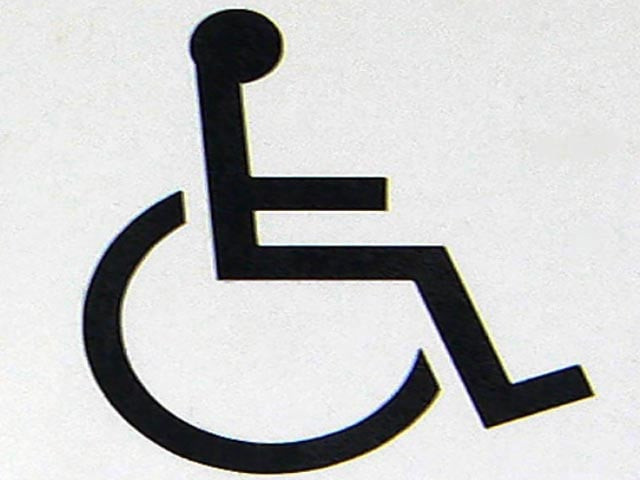Catering to the disabled: A system on crutches
The registration system still has a long way to go before it can enable the disabled.

Catering to the disabled: A system on crutches
Disabled people in the district have complained that the procedure for issuing computerised national identity cards by the National Database and Registration Authority (Nadra) does not take them into account.
Thousands of disabled people are facing great difficulties in acquiring CNIC cards, despite the passage of the Employment and Rehabilitation Ordinance for the Persons with Disabilities 1981, National Plan of Action 2008 and Disability Concession Card Act 2009.
Both of these laws were enacted to provide relief to persons with disabilities and to bring them into the mainstream for social inclusion. Hearing impaired Muhammad Irfan said that according to the Employment and Rehabilitation Ordinance for Persons with Disabilities 1981, one per cent quota was reserved for disabled persons. “This quota was increased to two per cent for 2.5 per cent population of persons with disabilities in October 1998.” However, a disabled person still cannot avail specific facilities without a CNIC, according to the Employment and Rehabilitation Ordinance for persons with disabilities 1981 and DCCA 2009. On the other hand, Irfan said that disabled people couldn’t get a CNIC without the disability registration certificate issued by the Social Welfare Department. “Both of these departments keep giving us the run-a-round. Each one tells us to go to the other first,” he said.
According to the World Health Organisation and other human rights based organisations concerned with the rights of persons with disabilities, over 9.6 per cent population falls into the disabled category and the reserved job quota stipulated by the government in this regard is insufficient. “There are hardly any provisions for disabled people in public offices and at bus stands and train stations. They are marginalised by society and the administration,” said NGO worker Nadeem Raza.
Haroon, a visually challenged person, said that the registration process at Nadra was cumbersome and that the added bureaucratic hurdles made it extremely hard for disabled people to claim disability benefits.
“Apart from the sending us on a wild goose chase between the social welfare office and Nadra, language is a major problem. Most of the submission forms are in English and we need to submit the forms at two separate offices, the Social Welfare Department at DHQ and the Labour Department,” he said.
Locals said that the entire process usually takes four to six months. “We have to wait a long time to obtain a certificate just to state that we have a disability.
Then it takes months to get registered with Nadra and the social welfare departments,” said Aleena, a recent Bachelor’s graduate, who is visually impaired.
Faisalabad is the third largest city of Pakistan, with a disabled population of 6.2 per cent. “Sadly, most of the people here are completely unaware of the existence of a disability certificate and how they should get it,” said a social worker Kamran Sohail, adding that many people who tried to acquire the documentation gave up when they discovered how long the procedure took.
The district is subdivided into six sub districts namely: Faisalabad City, Faisalabad Saddar, Jhumra, Jaranwala, Tandlianwala and Samundri and there is only one office to deal with disabled people, located near the District Head Quarter Hospital.
According to Article 3 (paragraph 2) of the Disability Concession Card Act 2009 (DCCA 2009), persons with disabilities have to obtain a disability registration certificate in order to receive their Disability Concession Card (National Identity Card) from Nadra. Article 5 (paragraph 2) describes that once a person has gotten a Disability Concession Card (Computerised National Identity Card with a Disability Logo), he or she will also get concession on public transport.
DCCA 2009 was an attempt by the government to include persons with disabilities in the mainstream but policy makers have ignored the accessibility issue. The registration process is littered with hurdles and the departments are not easily accessible to the people. “This legislation was meant to make our lives easier and include us. That is not the case, if anything it now takes us twice as long just to get an ID card,” said paraplegic Riaz.
Muhammad Naseer, who had one leg amputated, suggested that the government make the registration process easier for disabled people. “What we need is speedy registration, reserved seats in public transport, railway stations and jobs,” he said, adding “if the government is sincere in providing these for us all it needs to do is unitise the system.”
Keeping in view the total 9.2 per cent disabled population of PWDs and ensure the implementation of a National Action Plan 2009 the government needs to make provisions in government buildings for disabled people, especially courts and public places. “We need to launch an awareness campaign about the registration of PWDs by utilising print and electronic media,” said Raza.
Published in The Express Tribune, April 23rd, 2011.



















COMMENTS
Comments are moderated and generally will be posted if they are on-topic and not abusive.
For more information, please see our Comments FAQ